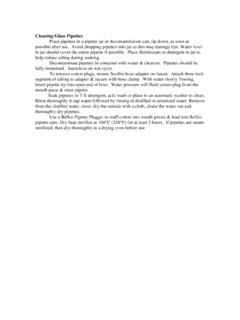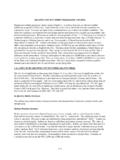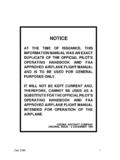Transcription of Cap & Thread Finishes - Bellco Glass
1 Cap & Thread Finishes : (GPI) Screw Thread cap sizes are expressed in two numbers, which refer to the cap diameter (in millimeters) & the GPI finish (at the top of the container). For example, a size 38-430 cap has a diameter of 38 mm, & fits a container with a 430 GPI Thread finish. GPI refers to the Glass Packaging Institute which is responsible for establishing & issuing uniform standards regarding the types of Finishes produced by American Glass Manufactures. The cap industry has not standard on dimensions the way the Glass industry has & it usually advantageous to buy both Glass & cap from the same supplier whenever possible. Similar to the Glass industry when cap finish is designated as 38-430, it means that the nominal diameter measured across the inside of the cap at the opening is approx.
2 38mm. The 430 designates a specific style of Thread . The Thread finish of the cap & Glass must be the same. A Glass with a 38-430 Thread finish should be used with a cap that has a 38-430 Thread finish. As a result the length of the cap may vary slightly from GPI s published values. Please review the charts. The dimensions are in inches. Determining Cap s Thread Finish & Style: To determine the cap size, place a ruler across the cap opening & read from one side of the inner wall to the opposite side of the inner wall. Compare this number to the numbers found in the T dimension columns in the table above. Once this number is found in the table, follow the row to the far left to find the Nominal Diameter of the cap.
3 To determine the specific style of Thread , measure the depth of the cap from the liner surface to the outside edge of the cap. Compare this to the numbers found in the H dimension columns in the table above that appear in the same row as the Nominal Diameter of the cap. Once this number is found in the table, follow the column to the top to find the specific style number. The dimensions in the tables are approximate & will probably be slightly different from what is measured (especially the H dimension-due to variations in liner thickness), but should be close enough to allow for proper determination of the cap size. Suggested Torques for Caps: The integrity of the cap to Glass seal is dependent upon a number of variables, such as the materials of the cap, liner & Glass , the sealing surface of the Glass , & the application torque applied to the cap.
4 The most important of these is the application torque. If the cap is applied too loosely, the contents could leak (especially during shipping). If the cap is applied too tightly, it may be too difficult to remove the cap, or the Glass could break during application. The table below offers some suggested torques that should provide an adequate seal for most applications. It is recommended that proper tests be performed to determine the optimum torque for the application. The most practical way to check the tightness is to measure the removal torque after the cap has been on the Glass for about 5 minutes. The removal torque should closely approximate the application torque.
5 The minimum removal torque noted in the table should be maintained after a 24 hour period. Dimensions are in inch-pounds. Polypropylene (PP) Caps: Rigid, solid, durable in cap form. Opaque, natural grayish yellow in natural form and does come in a variety of colors. Excellent stress crack & impact resistance. Excellent moisture barrier, good oil & alcohol barrier, poor gas barrier properties. Good chemical resistance. Sterilizable with EtO or autoclaving. Typical Properties of PP: (general guideline only) Max. Useable Temp. C: 135 Sterilization: Autoclave: Yes, Gas: yes, Dry Heat: no, Radiation: no, Disinfectants: yes Specific Gravity: Flexibility: rigid Brittleness Temp. C: 0 Tensile Strength, psi: 5000 H2O Adsorption/%: < Schott Caps & Pouring Rings Summary Please review the below chart for specifications on the Schott Caps & pouring rings.
6 (As ref only) Stock # DescriptionSize MaterialColorTemperatureChemical Leak-USA/ Pressue(mm)ResistanceResistanceProofFDA Rating5637-00040 Premium S/Cap45 TPCh260 Colorless -196 C to 260 C ExcellentExcellentYesNo5637-00046 Membrane S/Cap45 PP/PTFE Blue-40 C to 140 C GoodGoodNoYes-1bar 5637-90045 Hi Temp S/Cap45 PBTRed-45 C to 180 C Very good Very good NoNo5637-90032 Hi Temp S/Cap32 PBTRed-45 C to 180 C Very good Very good NoNo5637-00045 Blue Std S/Cap45 PPBlue-40 C to 140 C GoodGoodNoNo5637-00032 Blue Std S/Cap32 PPBlue-40 C to 140 C GoodGoodNoNO5637-00041 Premium Ring45 TPCh260 Colorless -196 C to 260 C ExcellentExcellentYes5637-91045 Hi-Temp Ring45 EFFERed-100 C to 180 C Very good Very good No5637-91032 Hi-Temp Ring32 EFFERed-100 C to 180 C Very good Very good No5637-10045
7 Blue Ring45 PPBlue-40 C to 140 C GoodGoodNo5637-10032 Blue Ring32 PPBlue-40 C to 140 C GoodGoodNo






